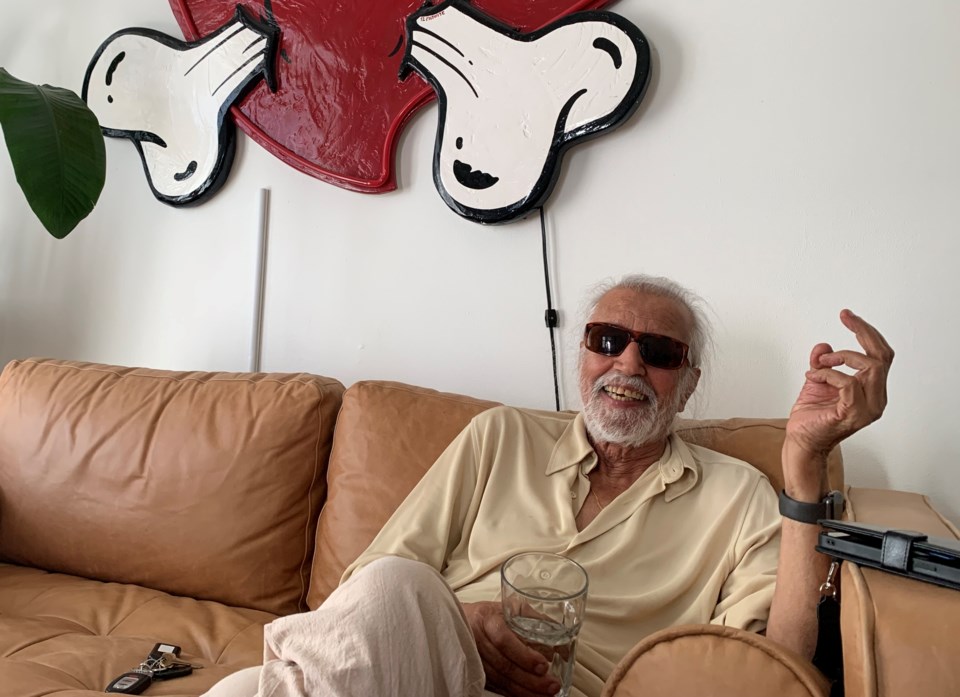An Emmy-winning Canadian filmmaker who worked on Mr. Dressup and The Friendly Giant is planning a documentary of the CBC and the National Film Board (NFB) of Canada.
Vic Sarin, who began working at the CBC in 1963, credits the public broadcaster with much of his success as a filmmaker.
“What makes life rich is not the money, not the famous experience of life, right?” Sarin said.
"And I just cannot talk enough on that how wonderful it has been. And because of CBC, I was there at the right time. They are so good to me. They let me do all the top shows."
He believes the NFB is uniquely positioned to tell the stories of Canadians, its work having made its brand recognizable worldwide.
Now, he wants to return that gift in documenting the past of the organization. He told Glacier Media the CBC has held together a huge country with a diverse population, telling the country’s stories in a way no other domestic organization can.
“I so want to do this little documentary,” Sarin said sitting on a couch in his Â鶹´«Ã½Ó³»office beneath a heart wall sculpture by local artist 12 Midnite, also known as Shon Franks.
“I want to celebrate CBC and the Film Board, these two organizations I think brought so much to the Canadian so-called creative area.”
Catherine O'Hara, Andrea Martin
Moreover, the 2022 Order of Canada recipient is hoping to get on board luminaries he’s worked with in the past such as William Shatner; former CBC journalist, host and former governor general Adrienne Clarkson; Dan Ackroyd; Catherine O’Hara and Andrea Martin.
“In this feature-length documentary Moving Images, we will introduce old and new generations alike to the post-war golden years of the CBC and NFB, illuminating five specific breakthroughs these institutions pioneered, making the case for how publicly funded media lent and helping hand to cinematic and cultural innovation,” the film’s pitch document said.
“The CBC was instrumental in setting a high bar for investigative journalism around the world, honing developments which included re-editing interviews, hidden cameras and ‘gotcha journalism’ visits to the home or office of an investigative subject,” the pitch said.
Sarin compared the CBC to the Australian Broadcasting Corporation and the British Broadcasting Corporation.
“Same models, CBC, they cater for the cross section of the society. It wasn't just numbers, ratings,” he said, noting the broadcaster has tied a vast nation together as Canadians tell their stories to each other.
“They were fantastic organizations, from my experience,” he said. “They were not pressured with for ratings.”
'Broadly educated public'
He despairs of bean-counters who watch page views for news stories.
“Every day I see a lot of the executives who are watching the bean counters and, to agree, the editors who have to answer them looking at page views and say, ‘Oh, well, this gets page views. We need more of that,’” he said.
“And I go, ‘No, no, . . . democracy relies on a broadly educated public. Ten people read the story, fine.”
The Kashmir-born Sarin came to Canada by way of Australia where his diplomat father had been posted.
“He got me a camera very cheap, because I didn't have to protect it and all that,” Sarin said. “I started making my own films, and I had no education, no training. So I was all self taught.”
He tried film school in Los Angeles, but wasn’t impressed and moved on.
“I never liked education. No patience,” he said.
When he got to the CBC, Sarin became involved in legendary shows such as The Fifth Estate, the documentary series Telescope (1963-1973) and This Hour Has Seven Days (1964-1966).
'So much pressure on me'
His stint with the CBC lasted until 1987, a time when he said he saw an Americanization of the network.
“They don't give a shit about good or bad. We want people to watch,” he said.
"So I remember for about a year I was struggling with that, to stay or go. I decided to leave. There was so much pressure on me from people I used to work with. And I said, ‘No, I think CBC is going to change.’ And I was right. CBC ever since, started to go down.”
Still, Sarin sees the CBC and NFB as having had many glory years. And that’s something he thinks is worth celebrating.
He said viewers will see legendary Canadian performers and journalists in the film.
“What all these 'creative people' brought to this country was a rich cornucopia of stories that were uniquely Canadian, bring our own sense of national excellence to the world stage,” the pitch said.
“Their unwavering dedication through journalism, entertainment and science contributed to our lasting creative spirit of innovation.”
But, as Sarin moves forward on the documentary dream, he still needs a place for it to air. But he’s patient and will wait for a broadcaster to speak up.
He knows which one he’d like to air the film.



